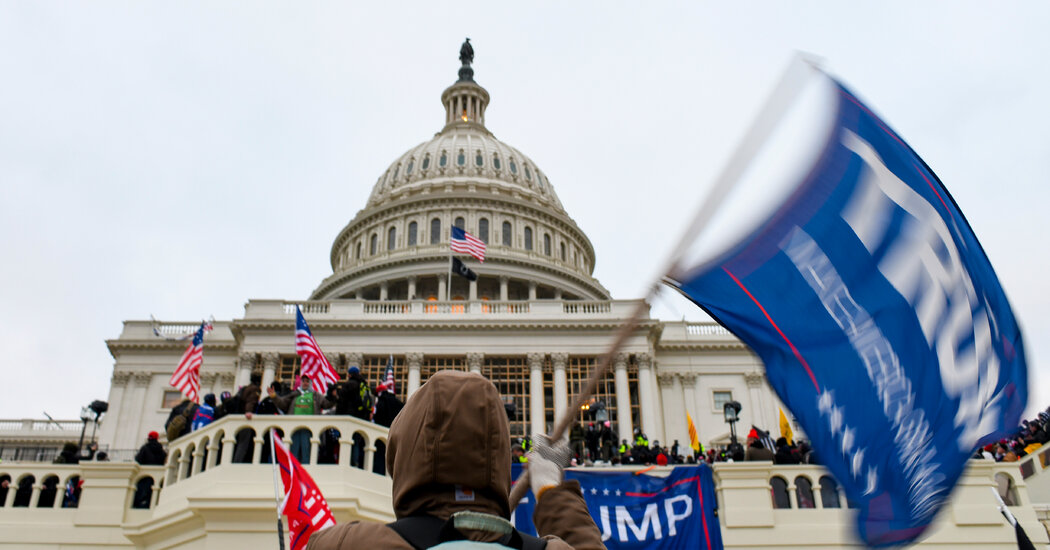
By almost any measure, the criminal investigation of the Jan. 6 attack on the Capitol is a prosecutorial effort of unparalleled complexity and scope.
For an entire year, federal agents in almost every state have been poring over mounting stacks of tipster reports, interviews with witnesses, public social media posts and private messages obtained by warrants. They have also collected nearly 14,000 hours of video — from media outlets, surveillance cameras and police-worn body cameras — enough raw footage that it would take a year and a half of around-the-clock viewing to get through it.
While the Justice Department has called the inquiry one of the largest in its history, traditional law enforcement officials have not been acting alone. Working with information from online sleuths who style themselves as “Sedition Hunters,” the authorities have made more than 700 arrests — with little sign of slowing down.
The government estimates that as many as 2,500 people who took part in the events of Jan. 6 could be charged with federal crimes. That includes more than 1,000 incidents that prosecutors believe could be assaults.
As of this week, more than 225 people have been accused of attacking or interfering with the police that day. About 275 have been charged with what the government describes as the chief political crime on Jan. 6: obstructing Congress’s duty to certify the 2020 presidential vote count. A little over 300 people have been charged with petty crimes alone, mostly trespassing and disorderly conduct.
But a big question hangs over the prosecutions: Will the Justice Department move beyond charging the rioters themselves?
So far, the department has provided no public indication of the degree to which it might be pursuing a case against former President Donald J. Trump and the circle of his allies who helped inspire the chaos with their baseless claims of election fraud. Attorney General Merrick B. Garland is scheduled to give a speech on Wednesday, one day before the anniversary of the attack on the Capitol, but is not expected to provide any signals about the direction of the department’s investigation. A spokeswoman said he would not address any specific cases or individuals.
On Capitol Hill, the House select committee on Jan. 6 is interviewing witnesses and has issued subpoenas to a number of high-profile figures allied with Mr. Trump. And with Mr. Garland and the Justice Department remaining mum about their intentions, members of the committee have signaled a willingness to exert pressure on the department, saying they would consider making criminal referrals if their investigation turns up evidence that could support a prosecution against Mr. Trump or others.
Even the prosecutions of those who rioted at the Capitol have presented an array of moral and legal challenges that have bedeviled judges, prosecutors and defense lawyers.
Overworked courts have tried to balance the laborious exchange of discovery materials with speedy trial protections and to manage the bleak conditions at Washington’s local jails where some defendants are being held without bail. They have also faced a fundamental, underlying tension: how to mete out justice on an individual level to hundreds of defendants who together helped form a violent mob.
Pleas and Sentences
With rare speed for a large-scale prosecution, more than 160 people — or slightly more than 20 percent of all who have been charged — have pleaded guilty at this point. Of those, not quite half have already been sentenced.
A few weeks ago, Robert Palmer, a Florida man who hurled a fire extinguisher at police officers, was sentenced to more than five years in prison, the longest term handed down so far. In November, one of the most familiar figures in the attack — Jacob Chansley, the so-called QAnon Shaman, who breached the Senate floor in a horned helmet with a fur draped over his shoulders — was sentenced to 41 months, a term he is appealing.
Beneath the headlines, however, there has been a steady stream of penalties for lower-profile defendants: bricklayers, grandmothers, college students, artists, church leaders and long-haul truckers who, by and large, have admitted to little more than illegally entering the Capitol.
Many, if not most, have avoided incarceration, sentenced to probation or stints of home confinement. Others have received only modest sentences, ranging from a few weeks to a few months.
In court, those accused of minor crimes have almost always expressed remorse, saying their behavior was foolish, embarrassing or out of character. Some have broken into tears or, in one case, physically collapsed. Others have vowed never to attend a political rally again.
Federal judges have taken slightly different positions on how to punish the defendants. Judge Trevor N. McFadden, appointed by Mr. Trump, often prefaces his sentences by calling the events that day “a national embarrassment” — though he has frequently declined to jail petty offenders. Judge Tanya S. Chutkan, an Obama appointee, has often given sentences higher than those requested by the government. Her go-to phrase: “There must be consequences.”
Judge Amit P. Mehta told John Lolos, a defendant clearly steeped in election fraud conspiracies, that not only had he been lied to, but those who had done the lying were not “paying the consequences.”
“Those who orchestrated Jan. 6 have in no meaningful sense been held accountable,” said Judge Mehta, another Obama appointee. “In a sense, Mr. Lolos, I think you are a pawn.”
Legal Challenges
From the start, prosecutors faced a unique legal problem: Never before had members of Congress been forced from the House and Senate floors while finalizing the transition of presidential power. What law should be used to charge this crime?
The government settled on an unusual obstruction law — the obstruction of an official proceeding before Congress. It brought the charge against scores of people believed to have disrupted the democratic process, often alongside more traditional counts of trespassing, vandalism and assault.
The obstruction law, which carries a maximum penalty of 20 years in prison, had a few advantages. First, it allowed the authorities to avoid deploying more politically fraught — and harder-to-prove — counts like sedition or insurrection.
It also permitted prosecutors to home in on the specific behavior of defendants and judge how much their actions contributed to the chaos that day. If someone went deep into the Capitol, say, or took some other action that helped to chase officials from their duties, chances are they have been charged with an obstruction count.
But many defense lawyers have claimed the law was wrongly used.
Passed in 2002 as part of the Sarbanes-Oxley Act, which sought to clamp down on corporate malfeasance, the measure was initially intended to prohibit things like shredding documents or tampering with witnesses in congressional inquiries. Defense lawyers have argued that prosecutors have stretched the law beyond its scope and used it to criminalize behavior that too closely resembles ordinary protest protected by the First Amendment.
In the past few weeks, however, five federal judges have ruled that the law is valid, and it now seems certain it will be permitted in scores of Jan. 6 prosecutions, including some that will soon go to trial.
Trials to Begin Soon
The earliest Capitol riot trials are scheduled to begin next month. When the proceedings start, jurors will most likely get a glimpse of how the government believes members of the mob worked together.
The first trial, set to begin on Feb. 24, will focus on Robert Gieswein of Colorado, a self-proclaimed militiaman charged with assaulting officers with a chemical spray.
Key Figures in the Jan. 6 Inquiry
In court papers, the government has indicated that it intends to show the jury videos of Mr. Gieswein’s assaults and to offer evidence that he told a reporter he was at the Capitol on Jan. 6 “to execute these fascists.” The papers also suggest that prosecutors believe Mr. Gieswein may try to argue he was acting in self-defense when he fought with the police — a strategy that several other defendants have embraced.
A second trial, scheduled to start on Feb. 28, will feature another accused militiaman, Guy Reffitt, a former oil industry employee who the government has said is a member of the Texas Three Percenters radical gun rights movement.
At Mr. Reffitt’s trial, prosecutors plan to tell the jury that he brought an AR-15 rifle and a semiautomatic handgun to Washington, and was wearing a special holster designed for concealed weapons. The government has also said it will call a Secret Service agent who will testify that he and other agents protecting Vice President Mike Pence that day were adversely affected by the chaos and violence.
How High Do the Prosecutions Go?
At least so far, prosecutors appear to be building their cases from the bottom up, starting with those they can accuse of definable crimes and looking for potential links to others.
That said, one possible avenue for moving up the food chain is the case of Owen Shroyer, the right-hand man of the far-right conspiracy theorist Alex Jones. Mr. Shroyer marched on the Capitol with Mr. Jones and Ali Alexander, the Stop the Steal organizer, on Jan. 6 and was arrested months later on disorderly conduct charges.
Neither Mr. Jones nor Mr. Alexander has been charged. But both men had connections to the Trump White House. Mr. Jones helped organize the rally at the Ellipse near the White House before the riot and has said that White House officials told him that he was to lead a march to the Capitol, where Mr. Trump would speak, according to the House committee investigating Jan. 6, which issued a subpoena to him in November.
It remains unclear how two other investigations into lawyers who have worked with Mr. Trump — Sidney Powell and Rudolph W. Giuliani — might also intersect with the inquiry into the riot. While neither of those investigations, which appear to be focused on financial improprieties and federal lobbying laws, are directly connected to the Capitol attack, both Ms. Powell and Mr. Giuliani helped Mr. Trump spread lies about the election before Jan. 6.
Perhaps the best source for potential charges against prominent political defendants is the House select committee. While the panel’s stated goal was to put together an authoritative record of the attack and recommend ways to ensure it never happened again, investigators have started to consider making criminal referrals to the Justice Department.
Countering the Disinformation
Even as prosecutors have demonstrated with vivid evidence the pro-Trump nature of the mob and the extent of the violence, Mr. Trump and his allies have continued seeking to rewrite the history of the Capitol attack through a nearly yearlong disinformation campaign. “The real insurrection happened on Nov. 3, the Presidential Election, not on Jan. 6 — which was a day of protesting the Fake Election results,” Mr. Trump declared in November.
At different moments, conservative commentators and politicians have dismissed those who took part in the assault on the Capitol as mere tourists and have lionized them as martyrs and political prisoners. They have alternately blamed undercover F.B.I. agents and leftists in disguise for the storming of the building.
One group of people has seen through these baseless claims: a subset of the defendants who have been prosecuted for attacking the Capitol. Several have stood up in court and admitted they felt betrayed by Mr. Trump and were deluded by his efforts to portray the election as rigged.
At his sentencing hearing, for example, Mr. Palmer said that he had recently recognized that the former president and those around him were “spitting out the false narrative about a stolen election and how it was ‘our duty’ to stand up to tyranny.”
Eventually, he said, he came to understand that “they were the tyrannical ones, desperate to hold on to power at any cost.”







